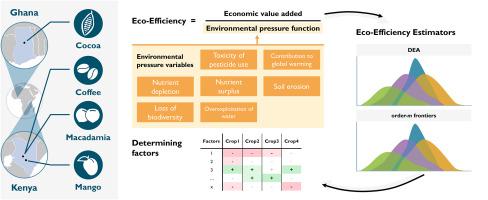Agricultural Systems ( IF 6.1 ) Pub Date : 2021-11-06 , DOI: 10.1016/j.agsy.2021.103304 Anja Heidenreich 1 , Christian Grovermann 1 , Irene Kadzere 1 , Irene S. Egyir 2 , Anne Muriuki 3 , Joseph Bandanaa 2, 4 , Joseph Clottey 2 , John Ndungu 3, 5 , Johan Blockeel 1 , Adrian Muller 1, 6 , Matthias Stolze 1 , Christian Schader 1

|
CONTEXT
Eco-efficiency offers a promising approach for the sustainable intensification of production systems in Sub-Saharan Africa. Data Envelopment Analysis (DEA), which is widely used for eco-efficiency analyses, is however sensitive to outliers and the analysis of the influence of external factors in the second stage requires the separability assumption to hold. Order-m estimators are proposed to overcome those disadvantages, but have been rarely applied in eco-efficiency analysis.
OBJECTIVE
This paper assesses the eco-efficiency of smallholder perennial cash crop production in Ghana and Kenya. It examines factors influencing eco-efficiency scores and in doing so, tests the application of order-m frontiers as a promising method for eco-efficiency analysis in the agricultural context.
METHODS
The analysis is performed for four selected perennial crop cases, namely cocoa, coffee, macadamia, and mango, applying DEA as well as the order-m approach to a comprehensive empirical dataset. Seven relevant environmental pressures as well as determining factors around capacity development, farm and farmer features, and crop production environment are considered.
RESULTS AND CONCLUSIONS
The distribution of eco-efficiency estimates among coffee farms showed the widest spread, which indicates the greatest potential to increase eco-efficiency. However, also the dispersion of scores within the other crop cases suggests room for improvements of eco-efficiency within the current production context. The subsequent analysis of determinants based on the order-m scores revealed that eco-efficiency scores were strongly influenced by variables, which measure capacity development, and resource endowments, such as labor and land, whereas the crop production environment had some influence, but results were unspecific. Generally, a positive effect is highly context-specific. The results underline the importance of designing effective training modalities and policies that allow knowledge to be put into practice, which involves the creation of marketing opportunities, the provision of targeted and regular advisory services, as well as region-wide measures to build and maintain soil fertility in a sustainable manner.
SIGNIFICANCE
To our knowledge, this study presents the first attempt to apply inputoriented order-m frontiers to assess eco-efficiency in the agricultural context, comparing its eco-efficiency rankings to those estimated with the widely applied DEA approach. This can inform the discussion on robust eco-efficiency assessments.
中文翻译:

撒哈拉以南非洲的可持续集约化途径:评估小农多年生经济作物生产的生态效率
语境
生态效率为撒哈拉以南非洲生产系统的可持续集约化提供了一种有前途的方法。然而,广泛用于生态效率分析的数据包络分析(DEA)对异常值很敏感,并且在第二阶段分析外部因素的影响需要可分离性假设成立。命令-米估计,提出了克服这些缺点,但在生态效益分析已很少应用。
客观的
本文评估了加纳和肯尼亚小农多年生经济作物生产的生态效率。它检查影响生态效率得分因素并在这样做,测试命令-的应用米边界作为在农业上下文生态效率分析有希望的方法。
方法
对四个选定的多年生作物案例进行了分析,即可可、咖啡、澳洲坚果和芒果,将 DEA 以及 order- m方法应用于综合经验数据集。考虑了七个相关的环境压力以及围绕能力发展、农场和农民特征以及作物生产环境的决定因素。
结果和结论
咖啡农场中生态效率估计值的分布显示出最广泛的分布,这表明提高生态效率的潜力最大。然而,其他作物案例中的得分分散也表明在当前生产环境中生态效率有提高的空间。后续基于阶次的行列式分析 - m得分显示,生态效率得分受衡量能力发展和资源禀赋(如劳动力和土地)的变量的强烈影响,而作物生产环境有一些影响,但结果不明确。一般来说,积极的影响是高度特定于环境的。结果强调了设计有效的培训模式和政策的重要性,以便将知识付诸实践,这涉及创造营销机会、提供有针对性和定期的咨询服务,以及在区域范围内建立和维护土壤的措施以可持续的方式生育。
意义
据我们所知,这项研究提出了第一次尝试应用投入前沿面的命令-米前沿,以评估在农业方面的生态效益,并将它的生态效益排名对那些与估计的广泛应用DEA方法。这可以为关于强有力的生态效率评估的讨论提供信息。











































 京公网安备 11010802027423号
京公网安备 11010802027423号